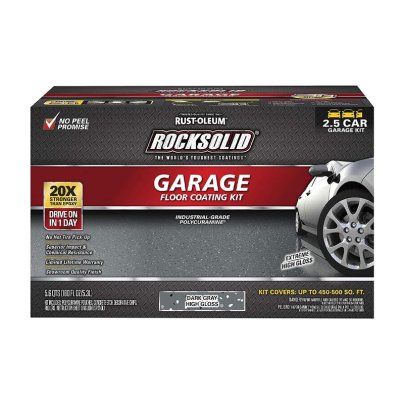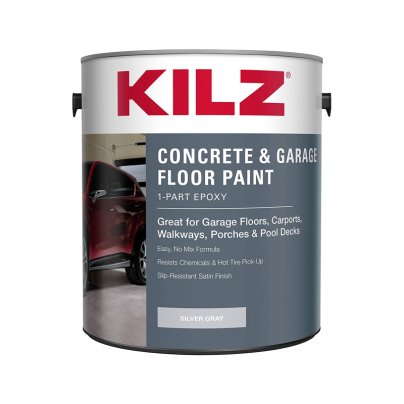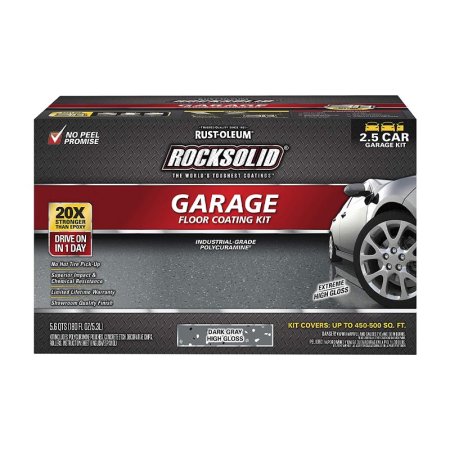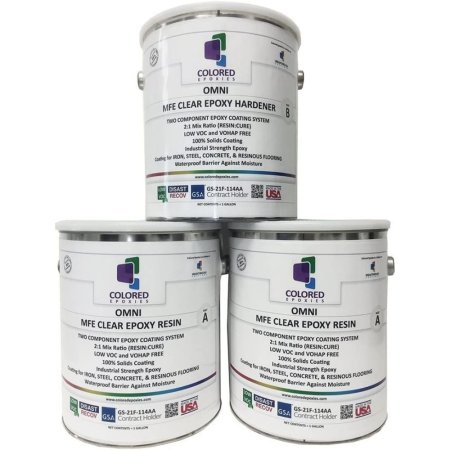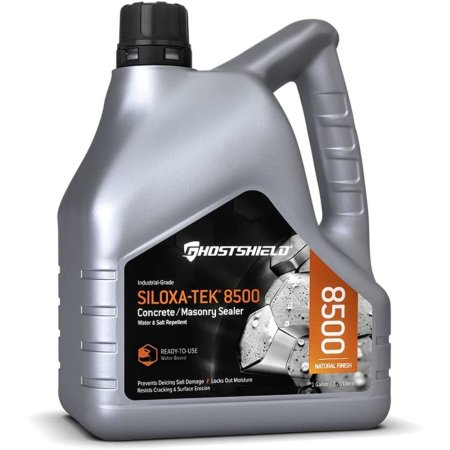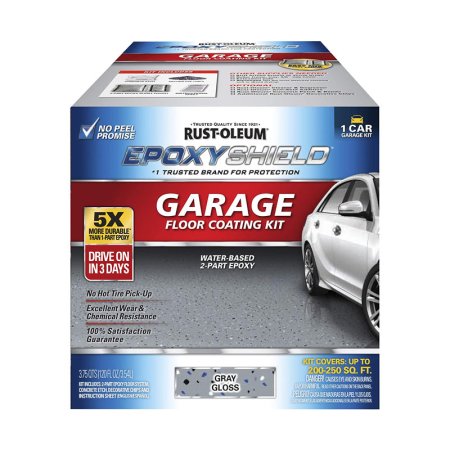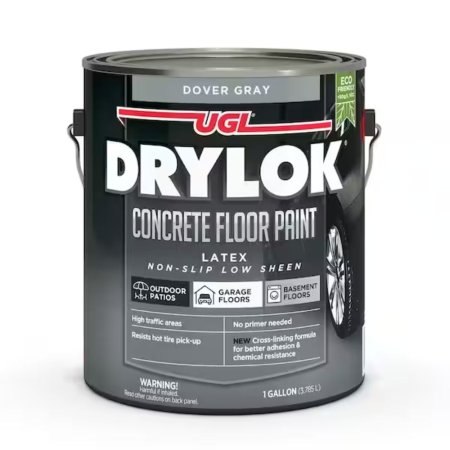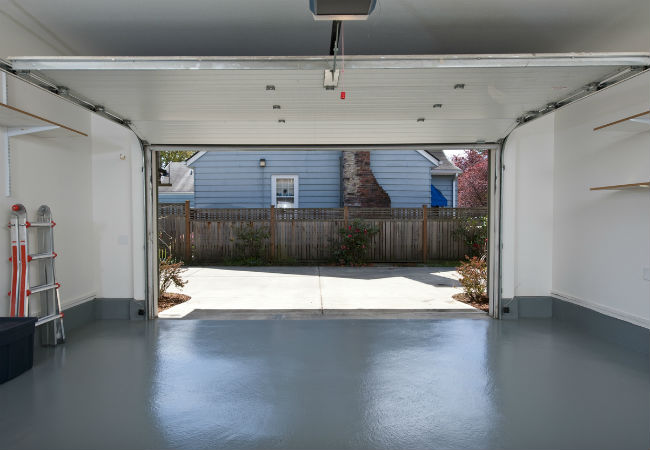
We may earn revenue from the products available on this page and participate in affiliate programs. Learn More ›
Between people, cars, bicycles, and even push mowers wheeled in for storage, a garage sees a lot of traffic. Eventually, the damage these things can cause will sully the overall appearance of a concrete floor and put it at risk of more severe damage, such as crumbling or even fires.
Fortunately, it’s possible to restore the looks of a garage and protect it from these threats by painting the garage floor. Our top pick is Rust-Oleum RockSolid thanks to its self-leveling and eco-friendly formula. Read on to learn more about the different types of garage floor paint, tips for using it, and why the following products are among the best you can buy.
- BEST OVERALL: Rust-Oleum RockSolid Garage Floor Coating
- BEST BANG FOR THE BUCK: Kilz 1-Part Epoxy Acrylic Garage Floor Paint
- UPGRADE PICK: Colored Epoxies Clear Epoxy Resin Coating
- BEST QUICK-DRYING: Ghostshield Siloxa-Tek 8500 Concrete Sealer
- BEST EPOXY KIT: Rust-Oleum EpoxyShield Garage Floor Coating Kit
- BEST ACRYLIC: Behr Premium Epoxy Concrete and Garage Floor Paint
- BEST LATEX: Drylok Latex Concrete Floor Paint
- ALSO CONSIDER: Rust Bullet – DuraGrade Concrete Coating

| Type | Coverage area | Ease of application | Colorways offered | |
| Rust-Oleum RockSolid Garage Floor Coating | Proprietary formula of polyurea, urethane, and epoxy | 450 to 500 square feet | Moderate | 6 |
| Kilz 1-Part Epoxy Acrylic Garage Floor Paint | Acrylic and epoxy | 300 to 500 square feet | Easy | 4 |
| Colored Epoxies Clear Epoxy Resin Coating | Epoxy | 300 to 500 square feet | Difficult | Clear (plus 12) |
| Ghostshield Siloxa-Tek 8500 Concrete Sealer | Sealer | Up to 250 square feet | Easy | 1 (clear) |
| Rust-Oleum EpoxyShield Garage Floor Coating Kit | Epoxy | 200 to 250 square feet | Moderate | 3 |
| Behr Premium Epoxy Concrete and Garage Floor Paint | Acrylic and epoxy | 300 to 500 square feet | Easy | 80 (or can be custom mixed) |
| Drylok Latex Concrete Floor Paint | Latex | 300 to 400 square feet | Easy | 8 |
| Rust Bullet – DuraGrade Concrete Coating | Polyurethane | Up to 350 square feet | Easy | 18 |
Our Top Picks
When we weighed the factors mentioned above, a handful of top-rated garage floor finishes came out on top. Keep reading so you can choose the best garage floor paint for your project.
Best Overall
Rust-Oleum RockSolid Garage Floor Coating
What We Like
- Extremely tough floor covering
- Eco-friendly low volatile organic compounds (VOC) formula
- Self-leveling
What We Don’t Like
- Coverage may be lacking
Product Specs
- Type: Proprietary formula of polyurea, urethane, and epoxy
- Coverage area: 450 to 500 square feet
- Ease of application: Moderate
- Colorways offered: 6
For a durable, tough garage flooring, check out Rust-Oleum’s RockSolid Coating. Made from a proprietary blend of epoxy-like ingredients called “polycuramine,” RockSolid is tough and long lasting. The self-leveling formula settles naturally into a flat, smooth surface and cures to a hardened, high-gloss finish that will withstand dirt, grease, and even chemical spills.
The most significant difference between two-part epoxy and this product boils down to premixing. RockSolid’s low-VOC product comes premixed and dries quickly. Furthermore, it takes only one coat of RockSolid to coat a clean, dry garage floor. The coating, which goes on with a roller, comes with color chips for the user to sprinkle on while the epoxy coating is still wet to achieve a terrazzo flooring look. One 2.5-car kit covers up to 500 square feet.
Get the Rust-Oleum RockSolid garage floor paint at Amazon, The Home Depot, or Walmart.
Best Bang for the Buck
Kilz 1-Part Epoxy Acrylic Garage Floor Paint
What We Like
- Easy to use and very affordable
- Durable, satin-sheen finish
- Recoat in 4 hours, with foot traffic allowable in 72 hours
What We Don’t Like
- Not as tough as true epoxies
Product Specs
- Type: Acrylic and epoxy
- Coverage area: 300 to 500 square feet
- Ease of application: Easy
- Colorways offered: 4
Spiff up that garage floor without spending a lot of money. The Kilz 1-part epoxy garage floor paint combines the flexibility of acrylic with the hardness of epoxy resin in a single product. The paint comes in a 1-gallon bucket in a gray shade that complements concrete garage floors and gives them an updated look.
This water-based paint creates a durable surface with a satin sheen that can withstand high traffic, plus it offers a measure of protection from oils and other spills. Instructions recommend two coats for the best coverage. It dries quickly, allowing the addition of the second coat about 4 hours after the first one. A single gallon will cover 300 to 500 square feet.
Get the Kilz garage floor paint at Amazon, Lowe’s, or Walmart.
Upgrade Pick
Colored Epoxies Clear Epoxy Resin Coating
What We Like
- A high-performance coating
- Excellent abrasion and impact resistance
- The ability to add colors, flakes, chips, and metallics
What We Don’t Like
- Complex preparation procedures
Product Specs
- Type: Epoxy
- Coverage area: 300 to 500 square feet
- Ease of application: Difficult
- Colorways offered: Clear (plus 12)
Colored Epoxies clear epoxy resin coating products are made in the U.S., and they are designed for a variety of architectural applications. While they are often used for home improvements such as coating garage floors or protecting countertops, they also provide a tough coating for plywood, iron, steel, and many kinds of commercial and industrial flooring.
The product contains zero VOCs, and it sets to form a completely waterproof barrier. The base product is clear, but it can be tinted or mixed with polymer or mica flakes, quartz chips, or metallic pigments. This complexity has two important consequences. First, the coverage will vary tremendously, and each blend needs to be calculated separately. Second, once the two parts are mixed, users have about 40 minutes to work until the product is not usable, so it’s important to work quickly.
Although the finish is extremely durable and versatile, it’s perhaps not a product for the inexperienced DIY user.
Get the Colored Epoxies garage floor paint at Amazon.
Best Quick-Drying
Ghostshield Siloxa-Tek 8500 Concrete Sealer
What We Like
- Dries in just 4 to 6 hours
- Creates a long-lasting, waterproof layer
- Can be used to protect a wide variety of porous building materials
What We Don’t Like
- Offers limited protection against oil, fuel, or other harsh chemicals
Product Specs
- Type: Sealer
- Coverage area: Up to 250 square feet
- Ease of application: Easy
- Colorways offered: 1 (clear)
While garage floor paints can provide a variety of attractive and durable finishes, sometimes all that’s needed is a quick-drying coating that will protect the porous structure. That’s exactly what Ghostshield Siloxa-Tek concrete sealer does.
It comes ready to use straight out of the container, and it’s easy to apply with a sprayer, brush, or roller. It penetrates the concrete, creating an invisible barrier that won’t crack or flake off, and it resists salt, mold, and mildew. It can also be used on brick, masonry, cinderblock, and tile. The product is approved by the U.S. Department of Transportation (DOT) for use on highways and bridges, and it’s equally suitable for driveways, patios, and basements.
Get the Ghostshield garage floor sealer at Amazon, Lowe’s, or The Home Depot.
Best Epoxy Kit
Rust-Oleum EpoxyShield Garage Floor Coating Kit
What We Like
- Produces a durable, high-gloss indoor finish
- Protects against gasoline, antifreeze, motor oil, and salt
- Single-coat process
What We Don’t Like
- Some have found it difficult to mix
Product Specs
- Type: Epoxy
- Coverage area: 200 to 250 square feet
- Ease of application: Moderate
- Colorways offered: 3
Those looking for an all-inclusive garage floor painting kit that includes prep materials need look no further than Rust-Oleum’s EpoxyShield garage floor coating kit. The kit includes an etching compound, decorative chips, and 3.75 quarts of floor finish, which should be plenty to cover 200 to 250 square feet or a 1-car garage. Once users mix the two parts of the formula and apply it by brush or roller, the cured coating protects the garage floor from unseen threats at home or those carried in from the road, such as road salt trapped in tires.
The epoxy coating can handle foot traffic within 1 to 2 days of application and car traffic by the third day. The long-lasting coating is more than just durable; its high-gloss sheen, coupled with the decorative chips included in the kit, can boost the beauty of a “blah” garage.
Get the Rust-Oleum EpoxyShield garage floor paint at Amazon, The Home Depot, or Walmart.
Best Acrylic
Behr Premium Epoxy Concrete and Garage Floor Paint
What We Like
- Ready-to-use product
- For indoor or outdoor use
- Huge range of colors
What We Don’t Like
- Not to be confused with a tougher 2-part epoxy
Product Specs
- Type: Acrylic and epoxy
- Coverage area: 300 to 500 square feet
- Ease of application: Easy
- Colorways offered: 80 (or can be custom mixed)
Offering better durability than ordinary latex paint, this no-mix, ready-to-use, water-based acrylic paint with epoxy in the formula handily keeps hot-tire pickup, scuff marks, fading, cracks, and paint blisters at bay. The potent paint’s impressive resistance to chemicals and vehicle fluids, such as oil and gasoline, reduces the need for frequent cleaning.
The paint’s smooth, satin finish makes chemical spills or accidental paint overspray a cinch to wipe off or mop up with only soap and water to bring back a floor’s spotless condition. The gallon-size paint can covers up to 500 square feet and comes in a wide range of available colors or in a custom hue selected via computerized color matching at the store.
Get the Behr garage floor paint at The Home Depot or Walmart.
Best Latex
Drylok Latex Concrete Floor Paint
What We Like
- Ceramic reinforced for added durability
- Easy to apply and clean up
- Good color range
What We Don’t Like
- Lacks the durability of epoxy or acrylic blends
Product Specs
- Type: Latex
- Coverage area: 300 to 400 square feet
- Ease of application: Easy
- Colorways offered: 8
Who needs primer? This latex concrete floor paint is ready to brush or roll on straight out of the gallon-size can without the need for a foundational coat. Even better, this product from Drylok still manages to best ordinary floor paints in longevity when exposed to hot tires, heavy traffic, frequent washings, extreme temperatures, or either acidic or alkaline spills.
With a no-fuss application, a generous coverage area of up to 400 square feet, and the ability to serve as paint for creative stenciling on the garage floor, this is an all-around quality concrete floor paint. While the white hue of the product can be tinted, the paint also is sold in multiple colors, including Persian Red and Dover Gray, to add bold or subtle glamour to bare or previously painted carports.
Get the Drylok garage floor paint at The Home Depot.
Also Consider
Rust Bullet – DuraGrade Concrete Coating
What We Like
- Protects against many chemicals
- Can be walked on in 6 to 12 hours; fully cured in 72 hours
- Can be further enhanced with flakes or an anti-skid coating
What We Don’t Like
- Several buyers reported it was very thick and found it hard achieve a smooth finish
Product Specs
- Type: Polyurethane
- Coverage area: Up to 350 square feet
- Ease of application: Easy
- Colorways offered: 18
As the name suggests, Rust Bullet was originally a product for preventing rust on metal—then someone experimented with it on a garage floor. DuraGrade was developed as a result. The patent-pending formula is low VOC, and it can be applied without special preparation or primer. It dries to form a tough layer that is resistant to water, oils, all fuels (including biodiesel and ethanol), and almost all chemicals.
Rust Bullet DuraGrade comes in a wide range of colors and can be enhanced further with flakes, though this must be done when the surface is still wet, and a top coat must then be applied. It can also be overcoated with Tread-Tex, which is a product that can be added to any floor paint to provide an anti-skid surface.
Get the Rust Bullet garage floor coating at Amazon, Lowe’s, or Walmart.
Jump to Our Top Picks
How We Chose the Best Garage Floor Paints
We researched the most sought-after garage floor paints in their respective categories and discovered that the best options are determined by their type, coverage area, colorways offered, ease of application, and other special features included by select brands.
The above list prioritizes acrylic, latex, and epoxy paint, as each offers durability by resisting scuffs, wear and tear, and stains. These options vary between 200 and 500 square feet of coverage, offering viable options for 1- or 2-car garages. While many who are looking to paint their garage floor usually look for a gray or white hue, select paints come in more colors such as yellow, red, or blue.
Finally, the garage floor paints in our lineup are easy to apply with the average paint roller and dry in just a few hours.
What to Consider When Choosing Garage Floor Paint
Factor in the following criteria to home in on the right floor finish for your garage. Some types of garage floor paint cost more than others, and different options will produce different results. Depending on the garage floor ideas you’re entertaining, some products work better than others.
Types of Garage Floor Paint
Painting a garage floor will improve the look and feel of the space. DIYers have three primary types of paint from which to choose: latex, acrylic, and epoxy. Each comes with different considerations outlined below. Before choosing a can of paint, consider the garage’s intended use and the desired durability of the new floor.
If the project is part of a garage conversion, such as transforming the garage into a family room or hobby room, it presents an opportune time to paint or install different types of floor coverings, such as indoor/outdoor carpeting or tile.
Latex Garage Floor Paints
A water-based product, latex garage floor paint contains a small amount of acrylic resin (though less than acrylic paint), and brushes and rollers clean up with just soap and water. Latex typically costs slightly less than acrylic paint and substantially less than epoxy garage floor paint.
Latex paint produces little to no objectionable fumes and dries quickly, often within a few hours. However, it’s not as durable as acrylic or epoxy paint. When used on a garage floor that isn’t exposed to the weather, such as a garage converted to a family room, it can prove an attractive and affordable coating.
Acrylic Garage Floor Paints
Acrylic garage floor paint features a higher acrylic resin content than latex paint. It offers a measure of suppleness, which is well suited in a garage that lacks climate control. As the concrete floor expands and contracts with temperature fluctuations, acrylic paint is less likely than latex paint to crack and chip.
Acrylic paint can cost up to twice as much per gallon as latex paint, but it’s more durable. It’s also less likely to fade in sunlight, so colors stay brighter and more accurate. Both latex and acrylic concrete paint apply easily.
Epoxy Garage Floor Paints
True epoxy paints, sold in buckets or kits as a “two-part” formula, consist of epoxy resin and a polyamine hardener that must be mixed together before application. This product comes in both solvent-based epoxy and water-based epoxy. The two vary in terms of application, cost, looks, durability, and maintenance. With an understanding of what to expect from each finish, you can narrow your options and find the best garage floor paints to safeguard and style your garage floor.
If a paint is labeled one-part epoxy, it actually consists of latex or acrylic paint with a small amount of epoxy resins mixed in. The manufacturers create a stronger, more durable paint by adding the resins. However, these paints will not result in providing true epoxy floors; they are actually a slightly more durable version of latex or acrylic paint.
Floor Condition and Material
A coat of paint won’t fix a damaged garage floor. For the best results, before painting, remove all dust and dirt, fill any cracks, and remove stains. Concrete surfaces should also be dry for the paint to adhere well. If your garage floor is asphalt, use a tinted asphalt sealer rather than a paint product. The oils in the asphalt will keep regular paint from adhering, and it could soon peel off.
Cost
Choose latex garage floor paint for the least expensive option, averaging 15 cents (or less) per square foot of coverage versus around 30 cents per square foot for acrylic paint. Epoxy garage floor paint is pricier, costing as much as $1.50 or more per square foot of coverage.
When comparing garage floor paint products, read the instructions to see whether they recommend one or two coats. A gallon of one-coat paint might cost more than a two-coat paint, but it could save money in the long run if you only need to apply one coat. If a separate primer coat is necessary, factor in that cost as well.
Appearance
When applied, both latex and acrylic garage floor paint tend to be runnier and less sticky in consistency than epoxy paint, and both dry into a less slick and lower sheen finish, which is ideal if you don’t want to draw focus to the floor. Epoxy, on the other hand, goes on thicker and stickier and cures into a glossier finish that provides an ultrapolished look.
If you’re more interested in specific colors than gloss, you may have better luck with garage floor paint, as it’s sold in a wide range of colors, whereas epoxy comes in more limited colors and clear varieties. To change the color of epoxy, you’ll need to tint the final coat of epoxy with color flakes. To match existing paint, take a chip of paint to a paint center to have it analyzed by a color-matching computer. The computer will read the hue and create a color formula that closely matches the color of another item, such as trim or even the color of a garage door.
Flat or matte paints are more difficult to keep clean than semi-gloss and gloss varieties that contain additional luster ingredients. For those trying to cover imperfections in the garage floor, such as cracks or spalling, matte and flat make better choices because they don’t catch the light, whereas every dip, dent, ripple, and crack will draw the eye if the surface is glossy.
Traction
With epoxy coatings being slicker, they’re also more slip-prone. If this is a concern, look for an epoxy kit that includes anti-slip/skid compounds to offer more traction underfoot. Flat or matte garage floor paint will still offer the most traction underfoot.
As a general rule, the higher the gloss, the slicker the surface. Some latex and acrylic garage floor paints contain ingredients that are specifically designed to increase traction, such as fine silica sand. The silica offers a slightly rougher texture that doesn’t detract from the paint’s overall look but does reduce the risk of slipping, especially if the floor is wet.
Application
Epoxy requires extensive floor preparation. First, the floor should be cleaned using a pressure washer and a degreaser. Next, it should be etched with either muriatic acid or an included etching compound to open up the pores in the floor and prepare them for the epoxy. Lastly, damaged concrete needs to be repaired with epoxy paste. After these steps, the epoxy primer can be applied, followed by two coats (or more) of epoxy, with color flakes added if desired. Applying a clear topcoat, which will usually be urethane-based, is the last step in the process.
Traditional epoxy coating comes in two parts that require thorough mixing before applying. Once you combine the two parts, you must use the product within a specific time, such as 30 minutes, before it begins to harden. While applying epoxy is often a DIY project, users should read the instructions carefully and familiarize themselves with the potential issues, such as the need to combine the two parts gently to keep out bubbles that can mar the look of the finished floor. Given the complexity, some homeowners may wish to hire an epoxy flooring contractor.
Applying latex or acrylic garage floor paint is more straightforward: Power-wash the concrete with a degreasing solution, then brush or roll on one or more coats of the paint. You often don’t need to etch or prime before painting the garage floor. However, failure to clean and prep the floor can result in peeling or bubbling paint.
Durability
A makeover with acrylic or latex garage floor paint usually lasts 1 to 2 years at most, with paints without any epoxy requiring the most frequent reapplication because they eventually flake off, chip, or stain from chemicals.
True two-part epoxy garage floor paints offer the best impact and stain resistance of any garage floor paints, followed by one-part epoxy. Being nonporous and chemical-resistant, epoxy coating can hold up for 3 to 5 years without flaking or chipping, even with exposure to extreme temperatures, vehicles, machinery, heavy foot traffic, and fluids or chemicals typical to a garage setting.
Both epoxy-coated and painted garage floors are susceptible to hot-tire pickup, meaning that when the finish delaminates, it might lift off the floor and onto a vehicle’s hot tires. If you live somewhere with regularly warmer climates, look for epoxies or garage floor paints labeled as resistant to hot-tire pickup.
Those with asphalt garage floors will want to avoid regular garage floor coatings, which are designed for use on concrete. Asphalt contains oils and solvents that can keep regular paint from adhering. Opt instead for a tinted asphalt sealer that will coat the floor and update its color.
Maintenance
You can keep both painted and epoxy-coated garage floors dust-free by dry mopping or sweeping them weekly. For deeper cleaning, you’ll have to be pickier about which solutions you apply to epoxy coatings than to garage floor paint. Two tablespoons of dish soap and a gallon of warm water applied with a foam mop works for cleaning up garage floor paint, but soap can cloud the glossy finish of epoxy.
For reflective floors, stick to soap-free and acid-free cleaning solutions, such as ½ cup of ammonia diluted in 1 gallon of warm water. You’ll find slick epoxy surfaces require the least elbow grease to wipe or mop down, while flat or matte garage floor paints have more friction and, therefore, take more time to clean.
Some types of epoxy coatings create a floor surface so durable that a car can drive over it without damage—think showroom floors—but acrylic and latex paints cannot stand up to that type of abuse. Consider adding a rubber parking mat to a garage stall to keep the car’s dirt and black tire marks from marring the painted surface. Foam floor mats for walking on or rugs also help protect walkways.
FAQs
If you still want more info about buying and using the best garage floor paint, read on for answers to some common questions about these products.
Q. What is the best type of paint to use on a garage floor?
Epoxy garage floor paint is the most durable, easiest to clean, and will last the longest.
Q. Is painting a garage floor a good idea?
Paint offers a simple way to upgrade this high-traffic area. Just make certain the garage floor is clean, dry, and in good condition before applying paint.
Q. Is latex paint a good choice for a garage floor?
Because latex paint dries quickly (often within a few hours) and doesn’t produce objectionable fumes, it can be a good choice for a garage floor that’s not exposed to weather, such as a garage that’s been converted to a family room. While it’s not as durable as acrylic or epoxy, it can be an attractive and affordable option.
